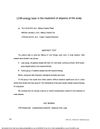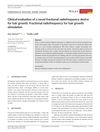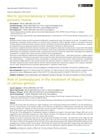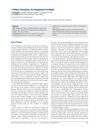October 2022 in “Experimental Dermatology” New technologies show promise for better hair regeneration and treatments.
 12 citations,
October 2017 in “Radiation Research”
12 citations,
October 2017 in “Radiation Research” mTORC1 signaling needed for quick hair follicle recovery after radiation damage.
 2 citations,
July 2023 in “International Journal of Molecular Sciences”
2 citations,
July 2023 in “International Journal of Molecular Sciences” BFNB could be a promising treatment for hair growth.
 December 2023 in “Trials”
December 2023 in “Trials” The trial is testing if a helmet that uses light can prevent hair loss during chemotherapy.
 January 2023 in “Dermatologic Therapy”
January 2023 in “Dermatologic Therapy” The nutritional supplement Pilopeptan® WOMAN improved hair growth and thickness in women with hair loss.
 January 2016 in “Global dermatology”
January 2016 in “Global dermatology” A treatment called Cellcurin, combined with microneedling, significantly increased hair density and diameter in patients with hair loss.
 March 2024 in “Bioactive Materials”
March 2024 in “Bioactive Materials” New treatment using engineered nanovesicles in hydrogel improves hair growth by repairing hair follicle cells in a mouse model of hair loss.
 July 2023 in “Journal of Clinical Medicine”
July 2023 in “Journal of Clinical Medicine” The document concludes that understanding hair follicle histology and the hair cycle is crucial for diagnosing alopecia.
 June 2023 in “Antioxidants”
June 2023 in “Antioxidants” Lipids from Schizochytrium sp. help prevent hair loss by protecting hair cells from damage and promoting hair growth.
 December 1997 in “Proceedings of SPIE, the International Society for Optical Engineering/Proceedings of SPIE”
December 1997 in “Proceedings of SPIE, the International Society for Optical Engineering/Proceedings of SPIE” Low-energy laser therapy can improve scalp alopecia treatment when combined with classical methods.
8 citations,
January 2020 in “Indian Dermatology Online Journal” PRP works faster and is a safe alternative to steroids for treating alopecia areata.
 October 2024 in “Scientific Reports”
October 2024 in “Scientific Reports” OXTR agonists may promote hair growth and be effective for treating hair loss.
 April 2024 in “Skin research and technology”
April 2024 in “Skin research and technology” Botulinum toxin A has limited effectiveness for 3 months in treating female pattern hair loss and may reduce scalp oiliness.
 April 2023 in “Journal of Cutaneous and Aesthetic Surgery”
April 2023 in “Journal of Cutaneous and Aesthetic Surgery” Using different hair loss treatments at various times can improve results and reduce side effects for people with chronic hair loss.
 20 citations,
September 2016 in “Indian Journal of Dermatology, Venereology and Leprology”
20 citations,
September 2016 in “Indian Journal of Dermatology, Venereology and Leprology” Platelet-rich plasma treatment significantly increased hair diameter and density, stopped hair fall, and boosted hair growth in men with hair loss, with no reported side effects.
 1 citations,
July 2023 in “Cureus”
1 citations,
July 2023 in “Cureus” Some treatments for hereditary hair loss are effective but vary in results and side effects; new therapies show promise but need more research.
 May 2024 in “Journal of cosmetic dermatology”
May 2024 in “Journal of cosmetic dermatology” A shampoo with caffeine and adenosine may help prevent hair loss and thicken hair.
August 2024 in “Nutrients” Probiotics help reduce hair loss and increase hair growth in people with androgenic alopecia.
 77 citations,
January 2015 in “International Journal of Biological Macromolecules”
77 citations,
January 2015 in “International Journal of Biological Macromolecules” Chitosan nanoparticles improve minoxidil delivery to hair follicles for better alopecia treatment.
 49 citations,
October 1994 in “Annals of Oncology”
49 citations,
October 1994 in “Annals of Oncology” Minoxidil not effective in preventing chemotherapy-induced hair loss.
 11 citations,
October 1980 in “Archives of Dermatology”
11 citations,
October 1980 in “Archives of Dermatology” Beau's lines and hair loss in a patient were linked to severe stress on the body.
 44 citations,
January 2021 in “Dermatologic Therapy”
44 citations,
January 2021 in “Dermatologic Therapy” COVID-19 may cause hair loss due to infection stress or treatments.
 9 citations,
January 2018 in “Dermatologic Therapy”
9 citations,
January 2018 in “Dermatologic Therapy” The HairLux device safely and effectively promotes hair growth in people with hair loss.
 29 citations,
May 2010 in “Annals of Pharmacotherapy”
29 citations,
May 2010 in “Annals of Pharmacotherapy” Finasteride may help some women with hair loss, but better options exist.
 29 citations,
January 1993 in “Dermatologic Clinics”
29 citations,
January 1993 in “Dermatologic Clinics” Certain medications and maintaining adequate iron levels can help manage women's hair loss.
 12 citations,
July 2020 in “Dermatologic Therapy”
12 citations,
July 2020 in “Dermatologic Therapy” Minoxidil, applied on the skin or taken orally, can improve hair growth in kids, but more research is needed due to possible side effects.
 September 2021 in “Медицинский совет”
September 2021 in “Медицинский совет” Proteoglycans, especially in Nourkrin®, can effectively and safely treat hair loss.
 January 2013 in “Elsevier eBooks”
January 2013 in “Elsevier eBooks” The conclusion is that understanding how patterns form in biology is crucial for advancing research and medical science.
 118 citations,
April 1998 in “Dermatologic Clinics”
118 citations,
April 1998 in “Dermatologic Clinics” Finasteride and minoxidil are effective for hair regrowth, while treatments for alopecia areata have varying success and continuous treatment is necessary.
 90 citations,
October 1996 in “Dermatologic Clinics”
90 citations,
October 1996 in “Dermatologic Clinics” Growth factors are crucial for hair development and could help treat hair diseases.


























